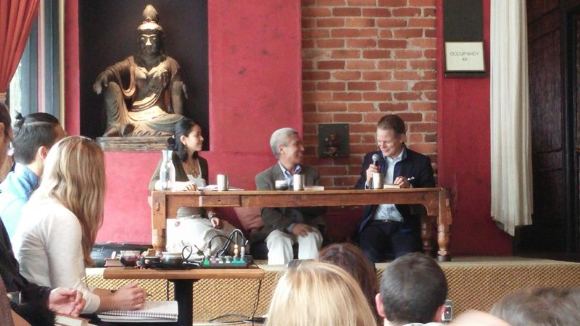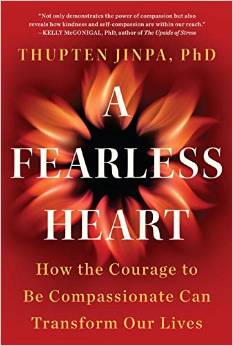Mindfulness & Compassion W/ The Dalai Lama's Translator
The Dalai Lama Fellows recently hosted a book reading with Thupten Jinpa, personal translator for the Dalai Lama himself for several decades. Part of the event included an insightful conversation hosted by none other than our very own Bela Shah!

I took the opportunity to speak to Thupten before the event and first asked him what the inspiration was for this book. He said that given the surge in interest around mindfulness and compassion across academia, business, and the general public, he felt that it would be of service to bring out some key insights, anecdotes, and research into the practices from his lifelong exposure to them.
Next I asked him if mindfulness leads to compassion. 'No'. Particularly interesting to me because of western co-option of the technique, including by elite military units for heightened situational awareness on and off the battlefield.
"Does compassion lead to self-compassion?" 'No.' He then told me
they're all 'separate muscles' that each need exercise. Later he added richness to this answer by sharing a story from the stage about how some psychologists once asked the Dalai Lama what he would recommend to help patients who suffered from self-hatred. A long conversation ensued where the Dalai Lama was certain there was a mistranslation of 'self-hatred'. He simply couldn't fathom that such a condition could exist!
Jinpa then went on to explain that the competitive nature of our society, which is absent in most traditional societies, creates a filter of judgment that we seem to internalize and then use quite harshly against ourselves in our attempts to self-improve. They discovered that as this filter of judgment grew stronger, it lead to the arising of self-hatred, which was an entirely foreign concept in the Tibetan Buddhist tradition.
What I was most struck by were Jinpa's approachability and humility, the depth and clarity of his answers, and a complete sense of non-dogmatism and openness about exploring the truth around these concepts. There was zero sense of clinging to any traditional or rigid notions about them from the Tibetan lineage and a willingness to absorb and bow to new insights, including from modern medical science.
It was a blessing to experience snippets of insight and presence from Thupten, and I'm delighted to share my copy of his book after I've made my way to the back cover.
Posted by Rahul Brown on May 23, 2015
SHARE YOUR REFLECTION
2 Past Reflections


On May 26, 2015 Zilong Wang wrote:
:)


On May 24, 2015 Varsha wrote:
Post Your Reply